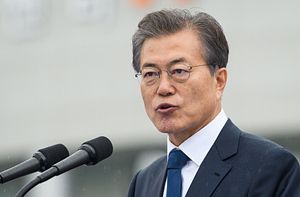In a country where the president is elected to a single five-year term with no possibility of re-election, the third year has always been a challenge for leaders in South Korea.
One former president, Kim Young-sam, lost public support in his third year due to resistance against a new labor law that his administration tried to introduce, while yet another former president, Kim Dae-jung, became embroiled in a corruption scandal involving his son.
Former President Roh Moo-hyun faced public criticism in his third year due to his attempt to seek a free-trade agreement with the United States, while the Lee Myung-bak administration came under fire for alleged illegal monitoring of the public. The last president before Moon, Park Geun-hye, also began to see public discontent mounting in her third year as several political scandals embroiled her term, eventually leading to her impeachment.
No wonder South Korean politics has a famous saying: “the nightmare of the third year makes the president a lame duck.”
The current Moon Jae-in administration kicked off in May 2017, which means Moon will enter his third year in office in 2019. And signs of the “nightmare” for Moon and his government have already begun to emerge.
One of the core members of the ruling Democratic Party of Korea, Sohn Hye-won, is currently under the media spotlight, with accusations of alleged speculation in real estate. Sohn disaffiliated herself from the party to minimize the public anger, but it does not seem like the dissatisfaction will dissipate soon.
Another ruling party member, Seo Young-kyo, is alleged to have called a judge into her office in 2015 and asked to have the level of punishment reduced for an acquaintance’s son, who was then on trial for a charge of attempted sexual abuse.
Closer to the president himself, Moon’s economic adviser Kim Hyun-chul recently resigned, taking responsibility for a controversy caused by his remarks. Kim said in a recent forum that retired South Koreans should go to Southeast Asian countries and that people referring to South Korea as “hell” would realize that the state of this country outpaces those of the Southeast Asian countries.
Opposition parties are also currently targeting Moon’s daughter, who recently moved abroad, speculating that her family left the country to avoid legal issues.
More importantly, South Gyeongsang Governor Kim Kyoung-soo on January 30 received a two-year prison term for his involvement in an online opinion rigging scandal. Kim was a key aide to Moon during his election campaign in 2017.
Although some of these scandals remain allegations or merely speculation, it is undeniable that all are a blow to Moon and his administration, which is struggling to boost the country’s sagging economy and maintaining the balance between international powers and North Korea.
Given the examples of the previous presidents, it is important for the government to handle these scandals carefully, but so far, its reaction to them has been unconvincing.
The president and his administration have been passive in coming forward to present an official narrative, allowing speculation about the allegations to spread — or worse indirectly admitting them.
Take the accusations about Moon’s daughter, for instance. The presidential office responded by saying it will take legal action against the opposition lawmaker for violating the privacy of Moon’s daughter while dismissing the allegation itself without a satisfying explanation.
And after Kim was sentenced to jail, Lim Jong-seok, Moon’s former chief presidential secretary, made remarks on his personal social media account, hinting that the ruling against Kim was unfair.
Moon’s public approval rates, which once reached more than 70 percent, fell below 50 percent since January and have not bounced back.
The latest poll shows that his approval now stands at 47 percent, a 1 percent drop from the first week of January.
Given the fact that all the scandals mentioned above are ongoing situations, there is the possibility that the approval rates will fall even further.
Does this mean Moon and his administration are set to be the next victims of the “nightmare of the third year”?
They still have the opportunity to reverse public sentiment and get back on track but, it all depends on how the administration deals with the ongoing scandals. One problem is that time is running out. Regardless of how the scandals are handled, it is difficult for any president with no prospect of re-election to avoid the “lame duck” label with his term running down.

































